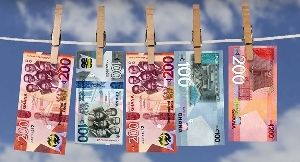In the fight against money laundering and terrorist financing, political will and commitment at the highest levels of government have emerged as critical factors determining the success or failure of West African nations.
The recent experiences of countries like Ghana and Nigeria have underscored the pivotal role of political leadership in driving effective implementation of the Financial Action Task Force’s (FATF) recommendations.
“Without strong political commitment, no country will exit the gray list. Ghana’s success in doing so was largely due to the government’s prioritization of these issues and their active involvement in the process,” Benjamin Kyei Armoo, the Chief Compliance Officer at GCB Bank has said.
In contrast, some of Ghana’s neighbors in the West African region have struggled to make meaningful progress, with participants in a recent Afreximbank Compliance Forum in Senegal noting a concerning lack of engagement from political leaders.
“The situation across the sub-region is largely because the political commitment and understanding of the importance of Anti-Money Laundering and Counter-Terrorist Financing (AML/CFT) measures is low,” Felix Obiamalu, the General Counsel of the Nigerian Financial Intelligence Unit, stated at the same event.
Experts during the Forum argued that this disparity in political will have serious implications for the region’s overall resilience against illicit financial flows and the stability of its financial systems. “AML/CFT is not just about ordinary crime. It is about the totality of a country’s system and how it operates. Without the backing of political leaders, these efforts will always fall short,” Mr. Obiamalu added.
The issue is particularly critical as West African nations grapple with the implications of the FATF’s revised Recommendation 24, which encourages countries to adopt measures to prevent corporate structures from being misused for criminal purposes.
While Nigeria and Ghana have made significant progress in this area, the lack of political commitment in other countries threatens to undermine the region’s collective efforts.
“If a country takes the approach that this is a ‘Western’ recommendation, then their compliance will be a bit slow. But when you’ve been on the gray list and come out, like Ghana, you know the importance of these measures and the impact they can have on your economy and international standing,” Mr. Armoo noted.
As West African nations navigate global financial regulations, the need for unwavering political leadership has never been more apparent.
Failure to address this critical challenge could jeopardize the region’s economic progress and undermine its standing in the international community. “We need to get the political leaders involved.
They should be empowering institutions like GIABA to direct each country and ensure a consistent, regional approach to AML/CFT compliance,” the GCB Compliance chief added.
These experts, who spoke on the second panel under the theme ‘The Implications of Ultimate Economic Beneficiary Identification’ provided participants with a high-level presentation of the main improvements and the motivation for these improvements initiated by the FATF recommendations.
The main aim of the panel was to draw the attention of participants to the main areas of intervention for the effective and efficient implementation of the FATF standards.
Other members of the panel were Chantal Bodet, Analyste Opérationnelle, FIA Côte d’lvoire; Thierno Deme, Deputy Director, Department of Supervision of the Non-Bank Financial Institutions, The Central Bank of West African States (BCEAO); and Alioune Niokhor Diouf, Director of Legal Affairs, FIA. Nicolas Négoce, Senior Reporter, BBC (West African Affairs Specialist), moderated the panel.
Background
It is not all gloom, however, as some progress in tax transparency and anti-money laundering efforts has been noted in across the continent.
The 2023 Tax Transparency in Africa report, revealed that African countries have generated additional revenues of €1.69 billion. This was achieved through voluntary disclosures, information exchange mechanisms, and thorough offshore investigations.
Funded through the Bank’s Transition Support Facility, the project aims to enhance resilience in West Africa by improving anti-money laundering and counter-terrorism financing regimes. It will focus on developing capacity in GIABA member states, particularly those in transition.
This initiative aligns with the Bank Group’s strategic engagements at both country and regional levels. It also supports the Bank’s policy on preventing illicit financial flows and its strategy for economic governance in Africa.
In a bid to accelerate progress, the African Development Bank and the Inter-Governmental Action Group against Money Laundering in West Africa (GIABA) have initiated a three-year project to combat money laundering and terrorism financing in their member countries.
The project, ‘Capacity Development for Anti-Money Laundering and Countering the Financing of Terrorism in GIABA Member States in Transition’, is supported by a US$5 million grant from the African Development Bank Group.
Watch the latest edition of BizTech below:
Ghana’s leading digital news platform, GhanaWeb, in conjunction with the Korle-Bu Teaching Hospital, is embarking on an aggressive campaign which is geared towards ensuring that parliament passes comprehensive legislation to guide organ harvesting, organ donation, and organ transplantation in the country.
Click here to follow the GhanaWeb Business WhatsApp channel
Business News of Tuesday, 24 September 2024
Source: thebftonline.com

















